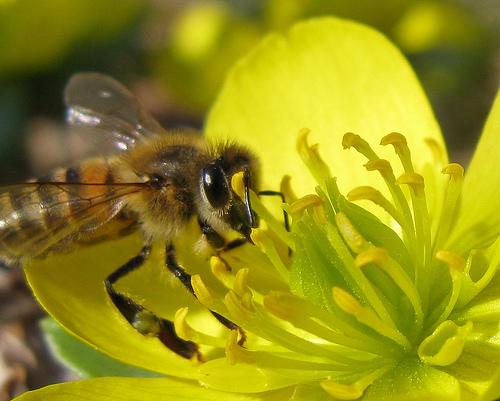
"But the bees that pollinate Indian crops are almost all wild. As a result, very little research has been done on their decline. "
Analysis by Michael Reilly | Tue Sep 28 | 2010 07:38 PM ET — When Colony Collapse Disorder swept through American and European bee populations in 2007, the western world was alerted to a startling fact: a huge portion of our food supply rests on the industrious pollinating habits of honey bees.
Now India, home to nearly 1.2 billion people, is facing a similar problem. The country’s pollinators are dwindling and its supply of nutritious vegetables like eggplant, squashes, and cucumbers, may be in jeopardy.
In a report presented at the British Ecological Society, Parthiba Basu of the University of Calcutta’s Ecology Research Unit found that the country’s pollinators, which include many small insects as well as bees, were in decline, but he and colleagues were at a loss to explain why.
In western countries, pollination has been industrialized; bee keepers ship their hives from coast to coast to meet the needs of the America’s fruit, nut, and vegetable crops. So when bees began dying en masse a few years ago, keepers were quick to raise the alarm. While everything from cell phone radiation to climate change was blamed for the mysterious deaths at first, scientists pounced on the problem and now believe some mix of parasites, pesticides, and stress may be to blame.
But the bees that pollinate Indian crops are almost all wild. As a result, very little research has been done on their decline. Basu and his team were forced to compare yields for pollination-dependent crops to pollination-independent crops to show that there was even a problem.
While pollination-independent crops, like wheat and rice, showed continually increasing yields in recent years, plants that relied on pollination to grow food flat-lined in their production, despite a continual increase in the number of acres of farmland planted during the study period.
The trend is worrying, and doubly so because the researchers don’t understand what’s causing it. Fortunately, the affected crops aren’t staples, and so therefore their decline shouldn’t threaten the country’s overall food security. Still, Basu said there s significant concern that people will not be able to maintain a nutritious diet. He told the BBC:
“There has been a debate within India about this, but most of the cereal crops are not pollinator dependent, so if there is a pollination crisis it is not going to affect food security as such. What is going to be affected is nutritional security.”







Speak Your Mind